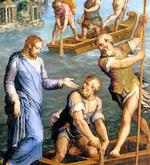Fathers of the Church
Epistle XV: to Januarius, Bishop
by Gregory the Great in 590-604 | translated by James Barmby, D.d
Gregory to Januarius, Bishop of Caralis (Cagliari).
Theodosia, a religious lady, being desirous of carrying out the intention of her late husband Stephen by the building of a monastery, has begged us to transmit our letters to your Fraternity, whereby, through our commendation, she may the more readily be counted worthy of your aid. She asserts that her husband had given directions for the monastery to be constructed on the farm called Piscenas, which has come into the possession of the guest-house (Xenodachii) of the late bishop Thomas. Now, though the possessor of the property would allow her to found it on land that is not her own, yet seeing that the lord with reason objects, we have thought it right to agree to her petition; which is that she should, with the Lord's help, construct a monastery for handmaidens of God in a house belonging to herself, which she asserts that she has at Caralis. But, since she says that the aforesaid house is burdened by guests and visitors, we exhort thy Fraternity to take pains to assist her in all ways, and lend the aid of thy protection to her devotion, so that thy assistance and assiduity may make thee partaker of the reward of her departed husband's earnestness and her own. As to the relics which she requests may be placed there, we desire that they be deposited with due reverence by thy Fraternity.
Taken from "The Early Church Fathers and Other Works" originally published by Wm. B. Eerdmans Pub. Co. in English in Edinburgh, Scotland, beginning in 1867. (LNPF II/XII, Schaff and Wace). The digital version is by The Electronic Bible Society, P.O. Box 701356, Dallas, TX 75370, 214-407-WORD.






